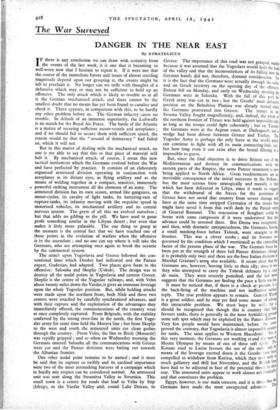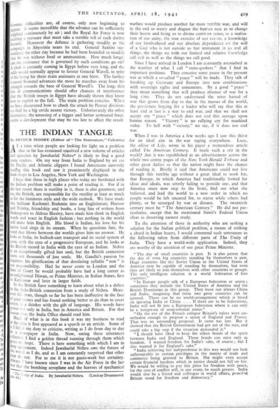The War Surveyed DANGER IN THE NEAR EAST
By STRATEGICUS
IF there is any conclusion we can draw with certainty from the events of the last week, it is one that is becoming so well-worn now that I hesitate to repeat it. If it were not that the course of the immediate future and issues of almost startling magnitude depend upon our grasping it, the events might be left to proclaim it. No longer can we trifle with thoughts of a defensive which may or may not be sufficient to hold up an offensive. The only attack which is likely to trouble us at all is the German mechanised• attack, and there cannot be the smallest doubt that no means has yet been found to canalise and check it. There appears, in comparison with this, to be hardly any other problem before us. The German infantry cause no trouble. In default of an immense superiority, the Luftwaffe is no match for the Royal Air Force. The battle of the Atlantic is a matter of securing sufficient escort-vessels and aeroplanes ; and if we should fail to secure them with sufficient speed, the reason would be that the " arsenal of democracy " had failed us, which it will not.
But in this matter of dealing with the mechanised attack, no one is yet able to say that this or that piece of material will halt it. By mechanised attack, of course, I mean this new tactical instrument which the Germans evolved before the War and have perfected by practice. It consists of an elaborately organised armoured division operating in conjunction with aeroplanes as its distant eyes, as flying artillery and as the means of welding together in a compact, sensitive, immensely . powerful striking instrument all the elements of an army. The armoured division has its own scouts, armed like gangsters, on motor-cycles, its cavalry of light tanks, its battering-ram of rupture-tanks, its infantry moving with the requisite speed in motorised vehicles, its mechanised artillery and its central nervous system. The germ of all this we evolved ourselves ; but that adds no gilding to the pill. We have used to great profit something similar in the Libyan desert ; but even that makes it little more palatable. The one thing to grasp at the moment is the central fact that we have reached one of those points in the evolution of warfare when the offensive is in the ascendant ; and no one can say where it will take the Germans, who are attempting once again to break the oceanic by the continental system.
The attack upon Yugoslavia and Greece followed the con- ventional lines which Douhet had indicated and the Panzer expert, Guderian, had adapted. Two places gave form to the offensive: Salonika and Skoplje (Uskub). The design was to destroy all the nodal points in Yugoslavia and eastern Greece. Skoplje is the centre of the Yugoslav railways, and, with Veles about twenty miles down the Vardar,it gives an immense leverage upon the whole Yugoslav position. But, while holding attacks were made upon the northern front, both Nish and these two centres were attacked by carefully synchronised advances, and with their capture and the exploitation of the advantages they immediately offered, the communications of the country were at once completely ruptured. From Belgrade, with the stability conferred by the strong river-line in the north, the first Yugo- slav army for some time held the Morava line ; but from Skoplje to the west and south the armoured units cut clean gashes through the country. From Veles, the line to Bitolj (Monastir) was rapidly gripped ; and so when on Wednesday morning the Germans entered Salonika all the communications with Greece were cut and the Panzer divisions were feeling out towards the Albanian frontier.
One other nodal point remains to be named ; and it must be said that its capture so swiftly and its cardinal importance were two of the most astonishing features of a campaign which in hardly any respect can be considered normal. An armoured unit was sent along the Strumitsa Valley to Strumica. This small town is a centre for roads that lead to Veles by Stip (Ishtip), to the Vardar Valley and, round Lake Doiran, to Greece. The importance of this road was not grasped, Mainly because it was assumed that the Yugoslays would hold the head of the valley and that the inconveniences of its falling into the German handsclid not, therefore, demand consideration. Yet it is the fact that the Germans were actually through the valley and on Greek territory on the opening day of the offensive. Doiran fell on Monday, and early on Wednesday morning the Germans were in Salonika. With the fall of this port the Greek army was cut in two ; but the Greeks' main defensive position on the Belashitsa Planina was already turned when the Germans penetrated into Greece. The troops in the Struma Valley fought magnificently, and, indeed, the whole of the northern frontier of Thrace was held against impossible odds as long as the troops could fight coherently ; but on Tuesday the Germans were at the Aegean coast, at Dedeagatch, and a wedge had been driven between Greece and Turkey. The Yugoslav Army is perhaps the only force in the world which can continue to fight with all its main connecting-links cut: but how long even it can exist after the brutal filleting it is impossible to guess.
But, since the final objective is to drive Britain out of the Mediterranean and destroy its communications with the eastern parts of the Empire, the same Panzer treatment is now being applied to North Africa. Great readjustments are an inevitable consequence of the initial successes in the Balkans; but the most serious blow strategically and morally is that which has been delivered in Libya, since it tends to suggest that the withdrawal of the forces for the assistance of Greece have not saved that country from severe damage and have at the same time stripped Cyrenaica of the troops that might have saved it from this swift dash by the Panzer units of General Rommel. The evacuation of Benghazi could be borne with some composure if it were understood that the advance could be arrested there. But Dema was recaptured; and then, with dramatic unexpectedness, the Germans, leaving a small masking-force before Tobruk, went straight to the frontier. This was a clever stroke ; and its fortunes are governed by the condition which I mentioned as the conuolluig factor of the present phase of the war. The German force has been put at the strength of three full Panzer divisions (though it is probably only two) and there are the four Italian divisions of Marshal Graziani's army also available. It seems clear that the Germans are, however, 'leaving little to their ally, since it yes they who attempted to carry the Tobruk defences by a coil de main. They were severely punished, and the last news suggests that the Germans are finding the pace a little too bo!. It must be noticed that, if there is a check at present, Its the back-firing of the machine and not ineffective tacnal reply. The true problem appears to remain. General Wavei is a great soldier, and he may yet find some means of solving this intractable problem. We must hope he will ; for I should be recognised that though this is country that brill favours tanks, there is generally in the most forbidding ground some 'soft spot which may be exploited by the Panzer divisions Very few people would have maintained, before the event proved the contrary, that Yugoslavia is almost impossitle count
_
for tanks. The same applies to Western Macedon.:. Yet, al, this very moment, the Germans are working rcund t: .e west Mount Olympus by means of one of these soft srts. Kozane road to Larisa favours the use of the tan!, and D! means of the leverage exerted down it the Greeks lave heel compelled to withdraw from Koritsa, which they to much gallantry and skill last November, and the lote5 have had to be adjusted in face of the potential threat to rear. The armoured units appear to work almost aut, :naticv 1!' and that constitutes the problem.
Egypt, however, is our main concern, and it is ther: Germans have made the most unexpected advances. German difficulties are, of course, only now beginning to appear. It seems incredible that the advance can be sufficiently supplied continuously by air ; and the Royal Air Force is now exerting a pressure that must take a terrible toll of such daring hazards. Moreover the defence is gathering steadily as the. campaign in Abyssinia nears its end. General Santini sur- rendered the other day because he had been hounded so steadily that he was without food or ammunition. How much longe: can the resistance that is governed by such conditions go on? A clash is certainly coming-in Egypt before very long, and the odds would normally appear to favour General Wavell, in spite of his losing his three main assistants at one blow. The farther General Rommel advances the more he marches away from his strength towards the base of General Wavell's. The long, thin line of communications should offer chances of interference that the British troops in Egypt have already shown they know how to exploit to the full. The main problem remains. When we have discovered how to check the attack by Panzer divisions we shall be a big stride nearer victory. Unfortunately the other alternative, the amassing of a bigger and better armoured force, seems a development that may be too late to affect the result.



























 Previous page
Previous page